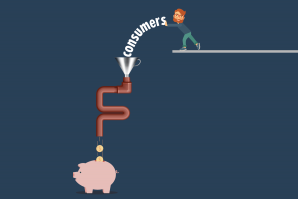/əm’pou(ə)r/, v.
To make someone stronger and more confident; to give (someone) the authority or power to do something.
It’s funny how closely “empower” and “in power” sound, considering their relationship to each other. Someone in power will always have to empower their subordinates to do get anything done. But it’s harder to do than it sounds — no matter how many bosses claim to empower their employees. The word is overused, and overuse leads to misuse. (Misuse leads to annoyance, and then we’re at a place where no one even understands or cares what you mean.)
But “empower” is not just another piece of jargon to be casually tossed around; employee empowerment really does impact your company’s bottom line. A 2012 Gallup poll found that “actively disengaged” employees cost their companies $370 billion in lost productivity. Alternatively, the Temkin Group’s Employee Engagement Benchmark Study in 2013 reported that highly-engaged employees are 480 percent more committed to helping their companies succeed. And to reach engagement, a boss needs to first empower.
We asked LaShelle Dozier, executive director of the Sacramento Housing and Redevelopment Agency (and featured in last year’s Women In Leadership issue), what she thinks of the concept — and what bad empowerment looks like.
The Buzz
Too many managers say they want to empower their team, “yet they tend to micromanage their staff, which actually can cause them to feel devalued, perhaps even powerless,” Dozier says. This can leave employees feeling that their boss doesn’t trust them to handle the responsibility delegated to them, she adds, and that’s demoralizing.
“I think leaders or managers often intend to empower their staff, but they don’t truly get out of the way and let them demonstrate their ability to exercise the authority they’ve been given to get a job done,” Dozier says.
The Word
An example of well-executed empowerment is when a manager assembles a team to tackle a project, defines the purpose and desired outcome, and gives the team the freedom to plan how the goal is achieved. “A very successful leader understands and recognizes highly-skilled and capable employees,” Dozier says. First, they’ll define expectations and then “move out of the way” and let their employees apply their training to finish the task at hand, she says.
Remember that the next time you’re around the conference table and people start passing around the word “empowerment” like the chocolate syrup on a buzzword sundae. If you truly want to empower your staff instead of just talking about it, remember to step back and create an encouraging space — not one of micromanagement.
Got a word that’s been buzzing around your office? Tweet us @Comstocksmag with the hashtag #WhatstheBuzz
Recommended For You

Buzzwords: Authenticity
Don't fake it
There’s a whole lot of buzz lately about authenticity: authentic leadership styles, authentic brands, authentic values, authentic marketing and advertising … and on and on. By definition, something is authentic if it is genuine, real, of unquestionable origin, not faked or copied, verifiable and trustworthy.

Buzzwords: Ideation
Why is the buzz all about the ideation phase?
Ideation is the process of generating new ideas through open-minded brainstorming. Ideation is exciting, it’s creative, and it’s a great teambuilding activity.

Buzzwords: Engagement
As it relates to the workforce, the degree to which employees are involved in, enthusiastic about and committed to their work and workplace.
Engaged employees are pivotal to an organization’s financial success, company culture, brand experience and ability to retain top talent. But according to Gallup’s most recent polls, only 31.5 percent of U.S. employees are actively engaged at work, and disengaged employees currently outnumber actively engaged employees 2 to 1.

Buzzwords: Sustainable
An ability to exist in perpetuity or maintain productivity indefinitely.
While we primarily talk about sustainability in terms of environmental impact, the principles of sustainability apply just as much to our social and economic ecology.

Buzzwords: Hardball
To be uncompromising in your methods or dealings, especially in business of politics
So while the word — and the practice — might make you roll your eyes, playing hardball can be useful and even necessary when the stakes are high. But please, use sparingly both verbally and in action.

Buzzwords: Funnel
Are you a customer that has fallen out of the funnel?
“If I have to use the word ‘funnel’ one more time today, I might die. #buzzwords” — @abhinemani
Posted on Twitter by Sacramento’s Chief Innovation Officer, Abhi Nemani, on Aug. 22, this was the tweet heard ‘round the Comstock’s office. It kicked off a lengthy debate among our staff about what “funnel” actually meant.

Buzzwords: Viral
Any video, meme, picture or internet-based media that becomes popular through the process of sharing, social media or email.
To understand the definition of going viral, let’s borrow a phrase from former U.S. Supreme Court Associate Justice Potter Stewart: You’ll know it when you see it

Buzzwords: Elevator Pitch
It happens every time: I’ll be at a business event and someone will inevitably say that we all need to “perfect our elevator pitches” and launch into a rote explanation (an elevator pitch of the elevator pitch, if you will). Cue the over-exaggerated rolling of my eyes.

Buzzwords: Bandwidth
In a tweet from March 2015, Forbes magazine called bandwidth a “geeky, pretentious shorthand for available manpower,” saying it was “a gentler brushoff than ‘We literally don’t have the energy to deal right now.’”

Buzzwords: Ecosystem
Generally speaking, an ecosystem describes how different, complex organisms work together. How could a deeply biological term have invaded the usually-technical jargon of business? According to Google Trends, searches for “business ecosystem” and “innovation ecosystem” first entered the lexicon in the late ’90s and hit a peak within the last year.

Buzzwords: Disruption
To be disruptive now means to change things, to get people to look at something in a new light. (I’d like to go back and convince my 6-year-old self that it’s actually a good trait that got me sent to the time-out chair.)
Like all jargon, “disruption” started out well-intentioned: Who doesn’t want to be the one with the fresh vision of how things could be — not how they are?

Buzzword: Placemaking
The improvement in the quality of a particular place, in the attempt to also improve the overall quality of the neighborhood, community or region in which the place is located.
At its best, placemaking can bring attention to forgotten, underserved or otherwise blighted corners of a city, and build a communal aesthetic that empowers residents and visitors to celebrate a neighborhood. However, it can also go awry.



